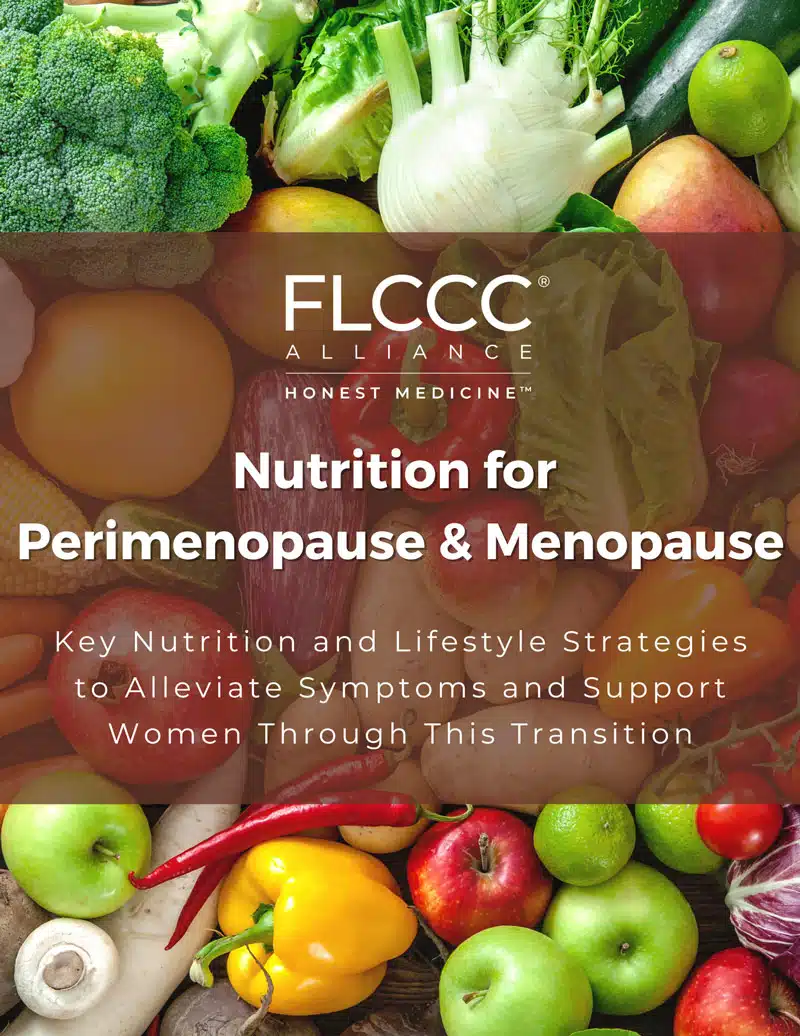Discover how good nutrition can ease symptoms and improve life overall! Explore essential dietary tips for a healthier transition through perimenopause and menopause.
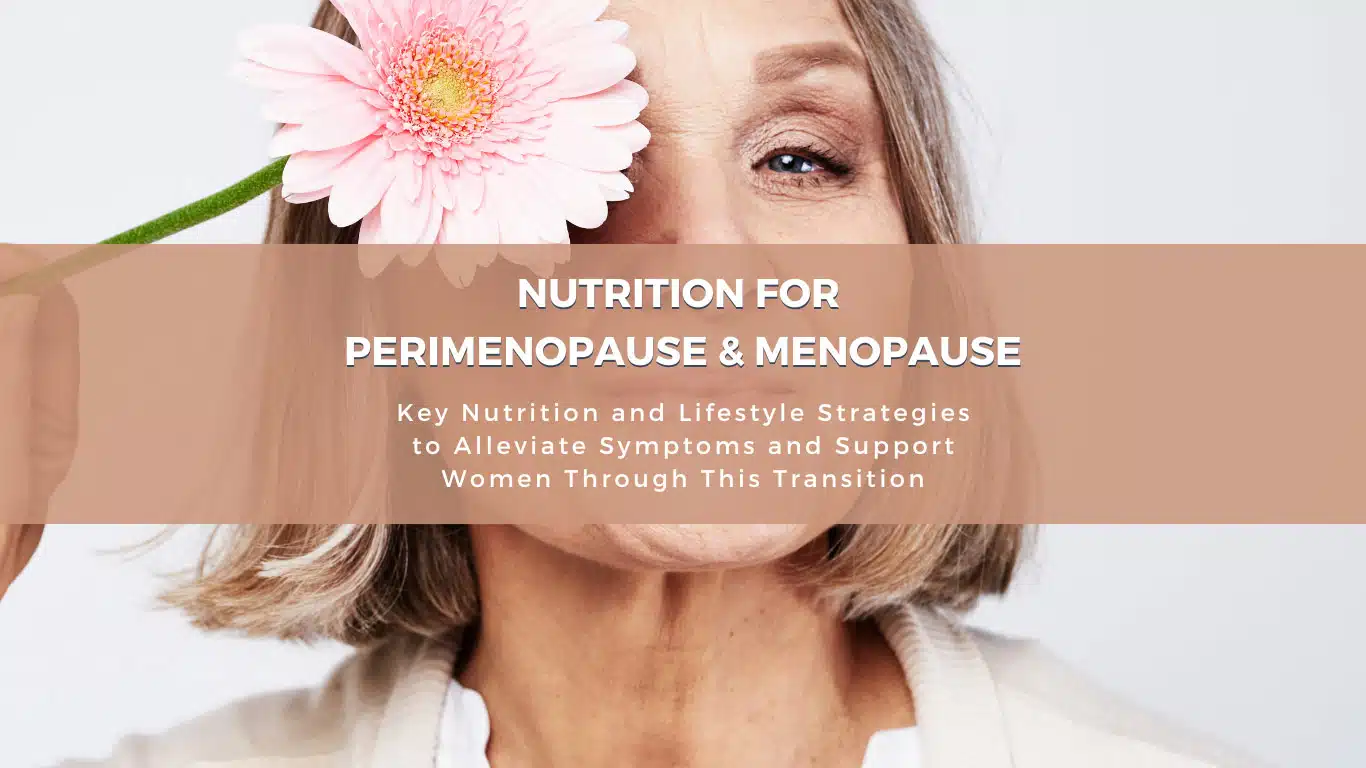
How you approach diet during menopause can make a world of difference in how you feel each day.
It might seem overwhelming, but understanding healthy eating during menopause is crucial for your well-being. Good nutrition supports your health and can help manage common menopause symptoms effectively.
FLCCC Senior Fellow Dr. @kristina_carman discusses the latest guide in our #WomensHealth series, ‘Nutrition for #Perimenopause and #Menopause,’ sharing key nutrition tips and lifestyle strategies to alleviate symptoms and support women through this transition.
Read more and… pic.twitter.com/C521DCVSmT
— FLCCC Alliance (@Honest_Medicine) November 15, 2024
Many women are unsure about what they should or shouldn’t eat during menopause. This may be new territory—but you aren’t alone. It’s easy to have concerns about weight gain, hot flashes, or not knowing what diet changes can help alleviate symptoms. But don’t worry—we’re here to help!
FLCCC Senior Fellow Dr. Kristina Carman has prepared this comprehensive guide! She breaks down everything you need to know about nutrition during perimenopause and menopause. We’ll explore essential nutrients, hydration tips, and practical advice to ensure you get the nourishment you need throughout this important stage of life.
Menopause: Introduction
Menopause typically occurs around the average age of 51, although it can range from the late 40s to early 50s. This is the point at which the ovaries, which are responsible for egg production, stop producing estrogen. Estrogen, a key hormone involved in sexual and reproductive development as well as various metabolic and cognitive functions, declines significantly during this time.
The transition into menopause doesn’t happen overnight. In fact, there’s often a span of 7 to 10 years leading up to and following menopause, known as perimenopause and postmenopause. During perimenopause—the years before menopause—the body’s estrogen levels begin to fluctuate, sometimes unpredictably. These fluctuations can lead to various symptoms like irregular menstrual cycles, hot flashes, and mood swings, as the body gradually adjusts to lower estrogen levels. Postmenopause refers to the years following menopause, where estrogen remains at a consistently lower level, marking the end of the reproductive years.
Symptoms of Menopause and Perimenopause
Understanding the symptoms of menopause can help you navigate this stage more comfortably. Common menopause symptoms and perimenopause symptoms include:
- Menstrual Cycle Changes: Changes in cycle length, frequency, or blood flow (heavier or lighter periods), missed periods, or irregular periods.
- Hot Flashes and Night Sweats: Sudden feelings of warmth, often intense, that can cause sweating and flushing of the skin.
- Sleep Disturbances: Difficulty falling or staying asleep, often linked to night sweats, waking up earlier than usual.
- Vaginal Dryness: Reduced natural lubrication, leading to discomfort or pain during sexual activity. Increased susceptibility to vaginal infections.
- Urinary Tract Changes: Increased frequency of urination, increased susceptibility to urinary tract infections (UTIs), potential urinary leakage or incontinence.
- Weight Gain, Especially Around the Midsection: A common shift in body fat distribution, with weight gain often accumulating around the abdomen.
- Changes in Mood: Mood swings, irritability, and increased emotional sensitivity. Feelings of anxiety or depression.
- Decreased Libido and Sexual Function: Reduced interest in sexual activity, possible difficulty achieving orgasm.
- Memory and Concentration Issues: Difficulty concentrating or remembering things, sometimes referred to as “brain fog”.
Additional Symptoms
Other symptoms that may occur during menopause and perimenopause include:
- Hair and Skin Changes: Thinning hair or hair loss. Skin changes, including dryness and a loss of elasticity.
- Joint and Muscle Aches: Increased joint stiffness and muscle pain, potentially due to estrogen’s role in reducing inflammation.
- Breast Changes: Breast tenderness or changes in breast tissue, possible increase in breast size or fullness.
- Digestive Issues: Bloating and changes in digestion, sometimes associated with hormonal changes.
- Headaches and Migraines: Some women experience an increase in headaches or migraines, particularly if they’ve had them in the past.
- Changes in Body Odor: Increased body odor or changes in how it smells due to hormonal fluctuations.
- Heart Palpitations: Occasional sensations of a racing or irregular heartbeat.
- Dry Eyes and Mouth: Reduced tear and saliva production, leading to dryness in the eyes and mouth.
- Increased Risk of Osteoporosis: Bone density loss over time, which can increase the risk of fractures.
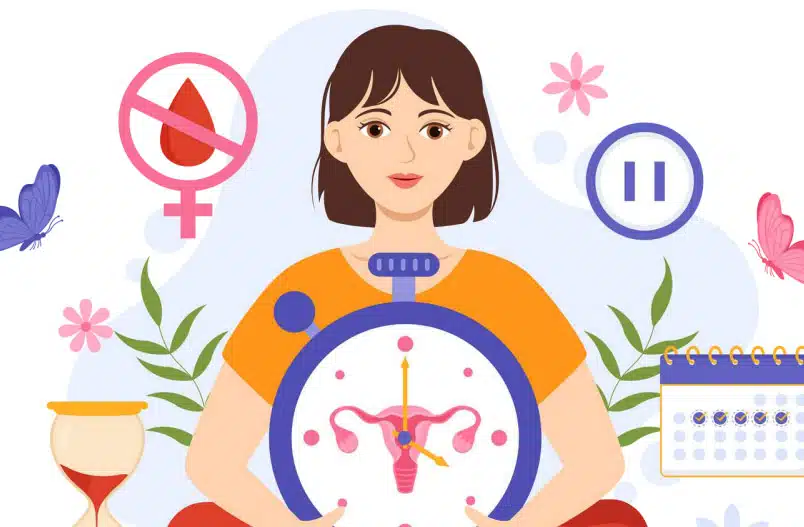
Health Risks After Menopause
After menopause, women are at higher risk for heart disease and osteoporosis. The hormonal shifts associated with menopause can lead to various symptoms and also elevate health risks following this transition.
Heart Disease
Estrogen helps protect against heart-related conditions such as stroke and heart attacks. As the female body produces less estrogen, the risk for heart disease increases. Additionally, at this time in a woman’s life, the risks for other conditions that affect heart health—such as high blood cholesterol, high blood pressure, and a sedentary lifestyle—are more common.
Osteoporosis
Both men and women experience a decline in bone mass as they age; however, women face a more rapid loss during the 4 to 8 years following menopause, primarily due to a reduction in estrogen production. This bone loss subsequently heightens the risk of developing osteoporosis.
Nutrition Tips for Menopause
Adopting a healthy diet and lifestyle can help manage menopause symptoms and support overall health.
Drink Adequate Fluids
Proper hydration can alleviate menopausal symptoms like hot flashes, night sweats, vaginal dryness, and bladder infections. Focus on unsweetened beverages and water-rich fruits and vegetables to maintain hydration levels. Be mindful to drink more water as needed, especially during periods of increased activity or heat exposure.
Limit or Avoid Alcohol
Excessive alcohol consumption over time can disrupt sleep, impair memory, and contribute to mood disorders, as well as increase the risk of health conditions like osteoporosis, high blood pressure, stroke, and ulcers. To support overall health, it’s recommended that women limit alcohol intake to 1 drink or less per day.
Limit or Avoid Spicy Foods and Caffeine
Spicy foods and caffeinated beverages may worsen hot flashes for some women. Opt for flavoring meals with herbs, sweet spices, alliums, mild peppers, or citrus juice instead of heat-inducing ingredients. To reduce caffeine intake, prioritize quality sleep, gradually decrease caffeine consumption, and choose alternatives like decaffeinated coffee or herbal teas.
Eat Nutrient-Dense Foods and Prioritize Protein Intake
Nutrient-dense foods are rich in vitamins, minerals, fiber, and phytochemicals. Examples include fruits, vegetables, whole grains, nuts, seeds, legumes, and lean proteins like fish and poultry. Increasing protein intake is important during menopause to support muscle mass and manage body weight.
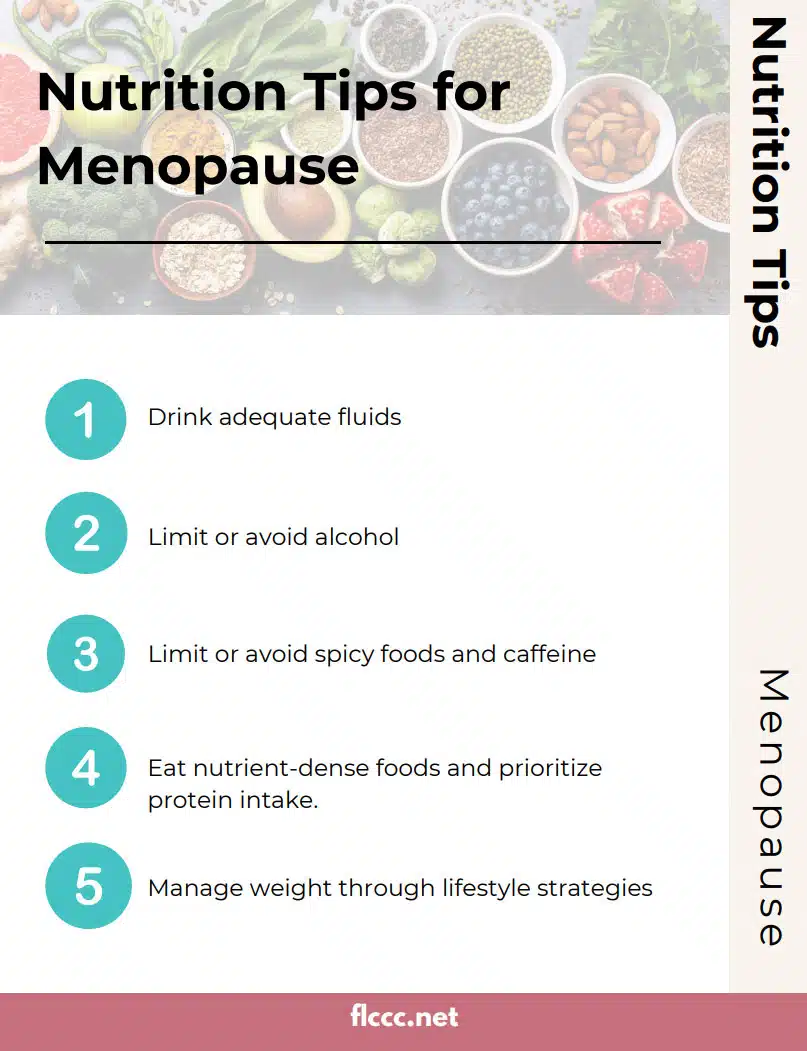
Tips for Increasing Nutrient-Dense Foods in Your Diet:
- Plan Meals Ahead: By organizing nutrient-dense meals in advance, you set yourself up for success.
- Explore Healthy Convenience Options: Consider bagged leafy greens, canned beans, and frozen berries for quick additions.
- Incorporate Plant Foods into Mixed Dishes: Add more fruits and vegetables to stir-fries, whole grain pasta, and smoothies.
- Increase Protein Intake: Ensure you are getting enough protein in all your meals.
- Enhance Flavor with Additional Ingredients and Cooking Techniques: Use herbs, spices, citrus, and alliums to season your dishes. Experiment with various cooking methods like steaming, roasting, and braising to create a range of flavors.
Manage Weight Through Lifestyle Strategies
Weight gain is a common symptom of perimenopause and menopause. If weight loss or maintenance is a goal, the following lifestyle strategies support weight management:
- Choose Balanced Meals and Snacks: Include a balance of macronutrients—protein, fat, carbohydrates—in your meals. Protein helps contribute to fullness between meals.
- Focus on Nutrient-Dense Whole Foods: Fiber in plant foods helps contribute to fullness. Ultra-processed foods may contain excess calories from saturated fat, added sugar, etc.
- Practice Regular Physical Activity: Include strength training to maintain muscle mass and engage in at least 150-300 minutes of moderate-intensity activity per week.
How to Support Weight Management:
- Avoid Restrictive Diets: Steer clear of restrictive diets, cleanses, or extreme exercise plans.
- Portion Control: For most meals, eat non-starchy vegetables and moderate portions of lean protein and whole starches.
- Measure High-Calorie Foods: Measure out portions of higher-calorie foods like oils and nuts.
- Set SMART Goals: Establish Specific, Measurable, Achievable, Relevant, and Time-bound goals for daily lifestyle habits.
- Allow Flexibility: Give yourself permission to enjoy fun foods such as desserts and snack foods as part of a balanced eating pattern.
- Choose Unsweetened Beverages: Opt for water, seltzer, tea, and coffee.
- Limit Alcohol: Avoid or limit alcohol consumption.
- Get Adequate Sleep: Aim for 7-9 hours of sleep per night.
- Engage in Stress Management Techniques: Practices like yoga, meditation, or deep-breathing exercises can alleviate stress.

Key Nutrients During Menopause
After menopause, women are at higher risk for heart disease and osteoporosis. Several key nutrients play a role in heart and bone health during menopause.
Unsaturated Fats
Also known as heart-healthy fats, unsaturated fats are found in mostly plant-based foods such as oils, avocados, nuts, and seeds, as well as fatty fish. Eating a diet rich in unsaturated fats, as opposed to saturated fats, is associated with a lower risk of heart disease.
Calcium
Calcium is a mineral that the body uses to build and maintain bone health, in addition to other functions. Calcium is found in dairy products, canned fish with bones, dark green leafy vegetables, tofu made with calcium sulfate, and fortified beverages.
Vitamin D
Vitamin D is important for bone health because it helps the body absorb calcium. Food sources of vitamin D include fortified milk (dairy and some non-dairy products), fortified cereals, egg yolks, and fatty fish. The body can also make vitamin D from sun exposure, though whether this allows the body to reach vitamin D needs depends on many factors. Because foods and sun exposure may not be the most reliable ways to get adequate vitamin D, speak to a practitioner about vitamin D testing and supplements.
Key Supplements During Menopause
In addition to a healthy diet, certain supplements may support your well-being during menopause. Always consult with your healthcare provider before starting any new supplements to ensure they are appropriate for your individual needs.
| Supplement | Benefit |
|---|---|
| Calcium and Vitamin D | Support bone health, reduce the risk of osteoporosis, and aid in calcium absorption. |
| Magnesium | Alleviates muscle cramps, supports sleep, reduces anxiety, and helps with bone density. |
| Omega-3 Fatty Acids | Support heart health, reduce inflammation, and may help alleviate mood swings and depression. |
| B-Complex Vitamins | Support energy production, reduce fatigue, and assist in managing hormonal fluctuations. |
| Vitamin E | May reduce hot flashes and night sweats, and supports skin health. |
| Vitamin K2 | Works with vitamin D to improve bone density and supports cardiovascular health. |
| Ashwagandha | Helps manage stress, supports adrenal function, and may reduce anxiety and hot flashes. |
| Black Cohosh | May alleviate hot flashes, night sweats, and mood changes. |
| Red Clover | Contains phytoestrogens that mimic estrogen to help reduce hot flashes and improve bone health. |
| Evening Primrose Oil | May help with hormonal balancing, particularly for hot flashes and breast tenderness. |
| Probiotics | Support gut health, which is closely linked to hormonal balance and overall well-being. |
| Collagen | Supports skin elasticity, joint health, and helps reduce hair thinning and brittle nails. |
| Adaptogens (e.g., Rhodiola) | Boost energy, improve focus, and combat fatigue associated with hormonal changes. |
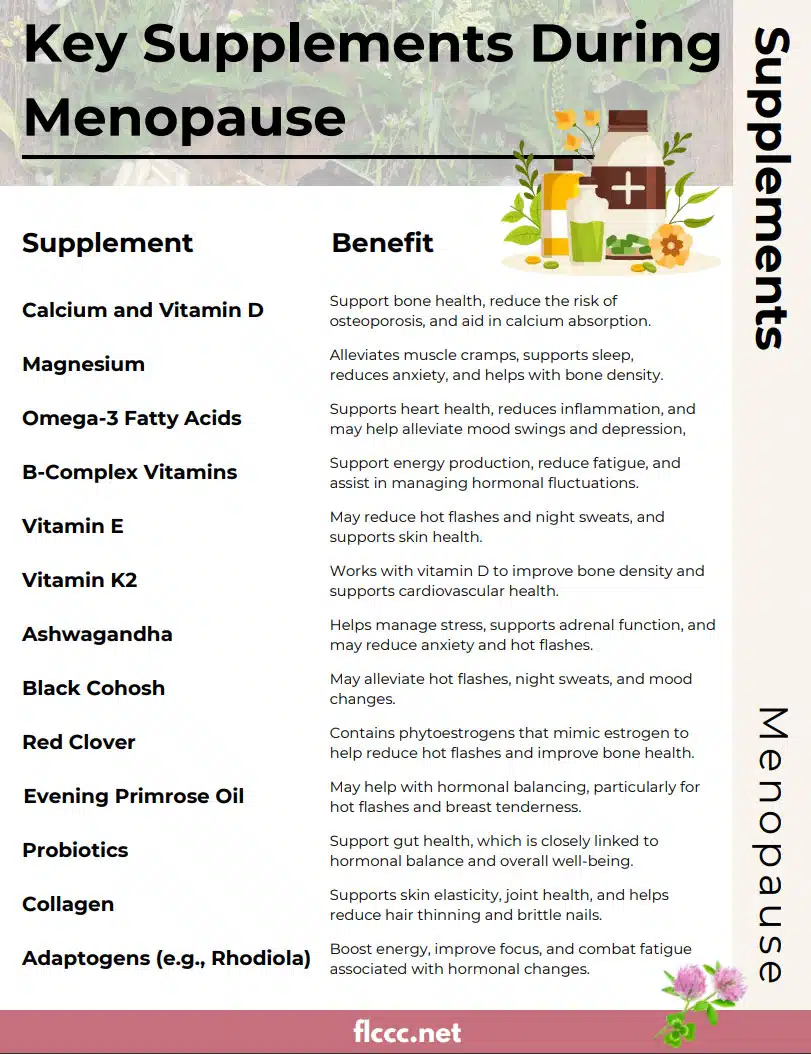
Supporting Overall Health During Menopause
On average, the transition into menopause is about 7 years but can be as long as 14 years. Experiencing a prolonged phase of change can be challenging for many women. Although hormonal shifts are unavoidable, women have the power to manage their lifestyle choices and can enhance their overall well-being during the menopausal transition.
Lifestyle Tips:
- See a Practitioner: Regular wellness exams, including dental and eye exams, are important during menopause.
- Eat Mostly Nutrient-Dense Whole Foods: Focus on a diet rich in fruits, vegetables, whole grains, lean proteins, and healthy fats.
- Limit or Avoid Alcohol, Spicy Foods, and Caffeine: These can exacerbate menopausal symptoms like hot flashes and sleep disturbances.
- Engage in Regular Physical Activity: Do at least 150-300 minutes of moderate-intensity activity per week, including at least 3 strength-training sessions.
- Stay Hydrated: Drink adequate fluids, mostly unsweetened beverages.
FAQs on Nutrition During Menopause
What are the best nutrients for menopause?
Key nutrients include calcium, vitamin D, and unsaturated fats. They support bone health and heart health, which are important during menopause.
What is the best thing to eat during menopause?
Focus on a balanced diet rich in nutrient-dense foods like fruits, vegetables, whole grains, lean proteins, and healthy fats. This supports overall health and can help manage menopausal symptoms.
How does a 50-year-old menopausal woman lose weight?
Combining a healthy diet with regular physical activity is key. Incorporate strength training to maintain muscle mass, and focus on whole foods while limiting processed foods.
What is the best diet for a 50-year-old woman going through menopause?
A diet that emphasizes nutrient-dense foods, adequate protein, healthy fats, and whole grains, while limiting alcohol, caffeine, and spicy foods, can support health during menopause.
How to maintain a healthy lifestyle during menopause?
Maintain a balanced diet, engage in regular physical activity, get adequate sleep, manage stress, and have regular check-ups with your healthcare provider.
Embracing the Journey: You’re in Control
Menopause is a natural part of life, and with the right tools and mindset, it can be a time of empowerment and self-discovery. By focusing on good nutrition, considering supportive supplements, and embracing a healthy lifestyle, you can reduce menopause symptoms and improve your overall health.
Remember, every woman’s experience is unique. Don’t hesitate to reach out to healthcare professionals, friends, or support groups. Sharing and learning together makes the journey all the more enriching.
Explore more on Women’s Health from Dr. Kristina Carman:


